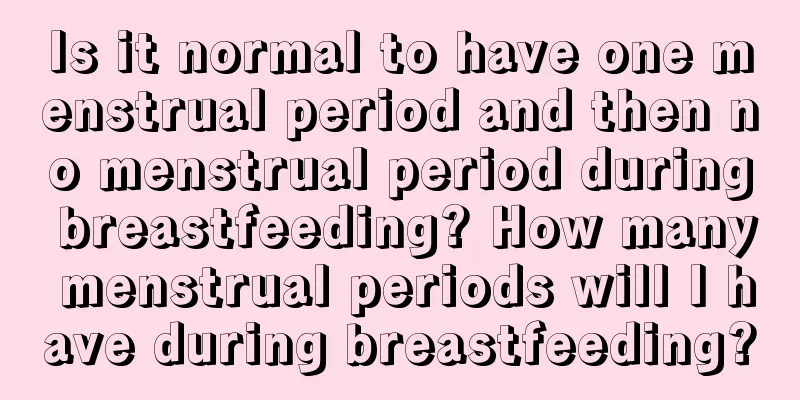What to eat during pregnancy to grow a baby? The secret to growing a baby without gaining weight during pregnancy

|
Many expectant mothers are afraid that their figure will change during pregnancy and they will gain weight after giving birth. In fact, as long as you pay attention to your diet and take in a balanced diet, you can also ensure that you can grow a baby without gaining weight during pregnancy. How to grow a baby without gaining weightTo achieve a healthy pregnancy without gaining weight, you must eat a healthy diet and exercise properly. Remember: pregnant women need about 2,500 calories a day. A healthy diet includes the following major food groups: 1. About 15% to 20% of calories should come from protein, such as meat, fish, eggs and beans. 2. About 25% to 30% of calories should be obtained from fatty foods, such as butter and cheese, as well as oils and nuts (fats). 3. About 55% to 65% of calories (the largest part) come from rice, noodles, bread, potatoes and other grains (carbohydrates). However, since the weight of pregnant women varies, the specific operation in daily life should also have a focus. For example, if the pregnant woman is overweight, she should reduce the intake of junk food and work harder on "not gaining weight"; if the pregnant woman is underweight, she must add more nutrients, increase high-quality fat, and spend more energy on "growing the fetus". What to eat to grow a baby without gaining weightOatmeal: To make yourself energetic in the morning, quickly replace the breakfast sesame cakes and fried dough sticks with oatmeal porridge! Why? Because oatmeal can not only keep you energetic all morning, but also lower the cholesterol level in the body. Don't choose those sweet and processed oatmeal. It is best to choose natural oatmeal without any sugar or other added ingredients. You can add some nuts, raisins or honey to the cooked oatmeal porridge according to your taste and preference. Skim milk: When you are pregnant, you need to absorb about 1 times more calcium from food than usual. Most foods contain limited calcium, so drinking more skim milk during pregnancy is your smart choice. Pregnant women should consume about 1,000 mg of calcium every day, and just 3 cups of skim milk (200 grams) can meet this need. Lean meat: Iron plays an irreplaceable role in the process of oxygen transport and red blood cell synthesis in the human body. During pregnancy, your total blood volume will increase to ensure that the fetus can be supplied with enough nutrients through the blood. Therefore, the need for iron during pregnancy will increase exponentially. If the body does not store enough iron, you will feel very tired. It is particularly important to supplement enough iron through diet. The iron in lean meat is one of the main sources of this demand and is also the easiest to be absorbed by the human body. Whole-wheat biscuits: This small snack has many uses: you can chew it carefully in bed in the morning, which can effectively relieve morning sickness; eat a few pieces in the car on the way to work to help you kill time; when you suddenly have a craving for food in the office, it is convenient and unobtrusive. It is a real mini food and will faithfully ensure that your blood sugar is stable and energetic throughout the day. Citrus: Although 90% of citrus fruits are water, they are still rich in vitamin C, folic acid and a lot of fiber. They can help you maintain your physical strength and prevent fatigue caused by dehydration. Bananas: Bananas can quickly provide energy and help you fight off any fatigue that may occur. And when you are often troubled by vomiting, it is easy for your stomach to accept. You can cut it into slices and put it in cereal porridge, or make breakfast with milk and whole wheat bread. Whole wheat bread: Replace your daily refined white bread with whole wheat bread, and you can ensure a daily fiber intake of 20 to 35 grams. At the same time, whole wheat bread can also provide rich iron and zinc. Green leafy vegetables: Spinach is rich in folate and zinc. Kale is a good source of calcium. Changing up your salad and adding some dark-colored lettuces will definitely improve the nutritional value of the dish, as the darker the color of the vegetable, the higher its vitamin content. You can also always add some fresh vegetables to your soup or dumpling filling. Nuts: If you shied away from nuts before pregnancy because of their high fat content, now you should reconsider: fat is important for the development of the fetal brain. And nuts can make you less hungry. Experts recommend replacing saturated fat (found in meat and butter) with some unsaturated fat (a type of fat found in nuts that is good for heart health). But because nuts are high in calories and fat, you should limit your intake to about 28 grams per day. Another thing to note is that if you usually have allergies, it is best to avoid eating certain foods that are prone to allergies, such as peanuts. Eggs: Many expectant mothers feel sick when they see meat, so eggs are the best source of protein for you during pregnancy. Eggs also contain various amino acids needed by the human body. Fried eggs and some vegetables will make your breakfast simple and hearty. If you can't stand the taste of fried eggs, then boil them and eat them. Daily diet suggestions for expectant mothersDuring pregnancy, eating enough and eating the right foods is important for the growth and development of your baby. You should always strive to eat a balanced diet. Here are some tips to keep you and your baby healthy: Eat a varied diet to get all the nutrients you need. Recommended daily diet: breads and cereals, multiple servings of fruit, a variety of vegetables, dairy products, high-protein foods (meat, poultry, eggs or nuts). Limit fats and sugars. Eat high-starch, high-fiber foods such as whole-wheat breads, cereals, pasta or noodles, rice, fruits and vegetables. Make sure you are getting enough vitamins and minerals in your daily diet. You can also ask your doctor to prescribe a list of prenatal vitamins that you should take during your pregnancy. Eat or drink at least four servings of dairy and calcium-rich foods each day to help you get the 1,200 mg of calcium in your daily diet. Eat at least three servings of iron-rich foods each day to ensure you get 30 mg of iron in your daily diet. Eat at least one food rich in vitamin C every day, including: oranges, grapes, strawberries, broccoli, honey, green peppers, tomatoes and mustard. Eat at least one food rich in folic acid every day, including: dark green vegetables, veal, beans. Pregnant women need 400 micrograms of folic acid every day to prevent birth defects such as spina bifida. Eat at least one food rich in vitamin A every other day, including carrots, pumpkin, spinach, kale, beets, almonds and cantaloupe. "No. 5 Parenting" (:yuer5h) |
<<: The principle of air fresheners Is air freshener flammable and explosive?
>>: What causes neonatal eczema? How to treat neonatal eczema?
Recommend
Should newborns be held more? Should newborns be held more or lie down more?
The development of newborns is one of the most co...
How often should babies take a bath in winter? The correct way to take a bath in winter
We all know that babies have tender skin, so they...
Can pregnant women eat goose liver?
Pregnant women can eat goose liver. Eating a mode...
Can pregnant women eat coconut jelly? Can babies eat coconut jelly?
Coconut jelly is a delicious food. It is very pop...
How many days can a newborn baby be exposed to the sun? How long can a newborn baby be exposed to the sun?
Newborns need calcium supplements after birth. Ta...
How to correct myopia in young children and what foods to eat to improve it
Eyes are the windows to the soul, so we should ta...
What foods can’t be eaten during breastfeeding? What should I do if my baby can’t finish the milk?
Everyone should know that it is better for childr...
How to effectively treat children's myopia and restore vision
In recent years, the age of wearing glasses has t...
What kind of bottle is suitable for warming breast milk? Why can't you use a microwave to warm breast milk?
In order to save time and effort, many mothers ch...
Are there any side effects of probiotics for babies? Are there any side effects of probiotics for babies?
Many parents will supplement their babies with pr...
Can I eat sausages after miscarriage? Is it good to eat sausages after miscarriage?
Women need special care after miscarriage, otherw...
What's the matter with the green color of the baby's diarrhea? Is the baby hungry after the diarrhea?
It is very common for babies to have diarrhea, an...
Can you get pregnant with a small amount of menstrual flow? The key is whether you can ovulate
Infrequent menstruation is a very common disease....
The most effective way to reduce belly fat after childbirth What to eat to reduce belly fat after childbirth
A firm, flat and curvy belly is what all girls wa...
Why is there no pregnancy on the pregnancy test stick? Why is there no pregnancy on the pregnancy test stick?
The quickest way to test whether you are pregnant...









